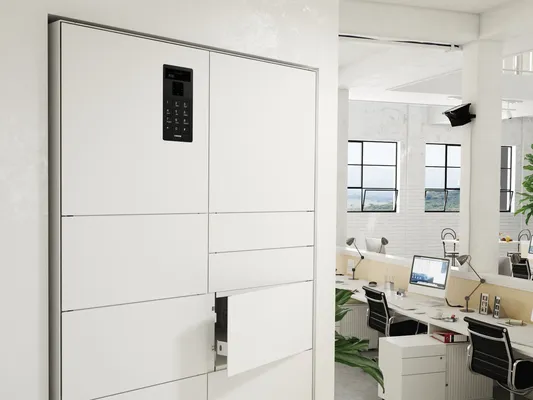
Revolutionizing secure storage
In an increasingly digital world, businesses are seeking more efficient, secure and convenient ways of storing and managing equipment and the personal belongings of their employees. Traditional lockers are often limited by manual processes, lack of security, and inconvenient access.
What are Smart Lockers?
Smart lockers are digital automated storage units that can be accessed via electronic means, such as RFID cards, mobile apps, or biometric recognition. These lockers are integrated with modern technology to provide features like real-time tracking, customisable access control, and remote monitoring. Unlike traditional lockers that rely on manual keys or combinations, smart lockers streamline the process of securing and retrieving items, making them an ideal solution for a variety of applications.
How do Smart Lockers work?
Smart lockers are equipped with sensors, touch screens, and connectivity options, enabling both users and administrators to interact with the system remotely. Here's how they typically function:
User Access: Instead of physical keys, users can access smart lockers through secure methods such as PIN codes, RFID cards, or even biometric recognition. The system verifies the user's identity and grants them access to an available locker.
Locking/Unlocking Mechanism: Once access is granted, the locker opens automatically, either with an electronic lock or through a motorized mechanism. When the user is finished, the locker securely closes and locks itself, often with a notification sent to the user or system administrator.
Real-time Tracking: Many smart lockers provide real-time tracking and status updates. Users and administrators can see if a locker is in use, available, or requires maintenance.
Secure and Flexible Storage: These lockers can be adjusted to suit different storage needs, whether it’s for small packages, parcels, clothing, or valuable items. Some systems even allow for temporary storage, ideal for parcel pickup or rental services.
Benefits of Smart Lockers
The rise of smart lockers can be attributed to several key advantages that enhance both security and convenience for businesses and individuals.
1. Enhanced Security
One of the most important benefits of smart lockers is their ability to provide higher levels of security. Traditional lockers can be easily tampered with or accessed by unauthorised individuals. In contrast, smart lockers use encrypted access methods. Many systems also provide tamper alerts or immediate notifications in case of suspicious activity.
2. Convenience and Accessibility
Smart lockers provide 24/7 access, allowing users to retrieve their items at any time, day or night. This is particularly useful in scenarios where users may not be able to pick up their items during normal business hours. The ability to access lockers remotely via apps also allows users to reserve lockers or track their status without needing to be physically present.
3. Contactless Transactions
With the increasing demand for contactless solutions, especially in the wake of the COVID-19 pandemic, smart lockers offer a safe alternative to traditional methods that require physical contact. Users can unlock lockers via their smartphones or facial recognition, reducing the need for physical interaction with surfaces, keys, or buttons.
4. Efficient Space Utilization
Smart lockers can be designed to maximise space efficiently. The lockers can adjust their size depending on the items being stored, and many systems include the ability to consolidate unused space.
5. Cost Savings
While the initial investment in smart locker systems can be higher than traditional lockers, they can ultimately lead to cost savings. With the ability to automate the management of storage spaces, businesses can reduce the need for staff to manually monitor and distribute locker keys, resulting in greater operational efficiency. Additionally, reduced theft or loss of items due to enhanced security features saves both money and time.
6. Customizable and Scalable
Smart lockers are highly customizable, offering a range of configurations, features, and sizes to fit specific needs. They are also scalable, meaning businesses or institutions can add lockers as needed, whether it's for increased parcel storage or a growing customer base. This flexibility makes them suitable for a wide range of industries, from retail and logistics to healthcare and education.
Applications of Smart Lockers
1. E-Commerce and Delivery
Online shopping has fueled a surge in demand for smart lockers, especially for package delivery and pickup. Retailers and delivery services can use smart lockers to safely store parcels for customers to pick up at their convenience, reducing missed deliveries and the risk of theft.
2. Corporate and Office Environments
In corporate settings, smart lockers can be used to store personal items, work documents, or even office equipment securely. They also support remote workers by offering lockers that can be used for storage during occasional office visits, promoting flexibility.
3. Education
Smart lockers in schools and universities are being used to securely store student belongings, books, or electronics. With biometric or mobile access, students can access lockers between classes or during after-school activities, minimizing time spent searching for storage.
4. Fitness Centres
Gym-goers often use lockers to store personal items while they exercise. Smart lockers offer more secure and personalised options, reducing the likelihood of lost or stolen items.
5. Healthcare
Hospitals and healthcare facilities use smart lockers for storing medical supplies, pharmaceuticals, and personal items for staff or patients.
CCKeys Smart Lockers
Smart lockers are transforming the way we store and access our belongings, offering a secure, convenient, and tech-forward solution for a wide range of industries.




